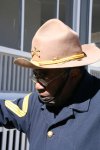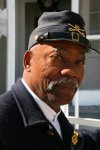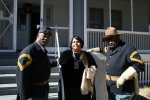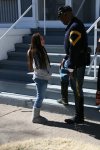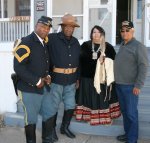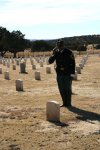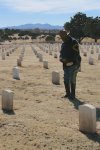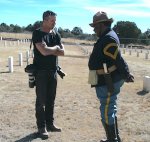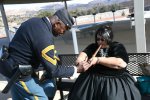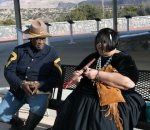Photos and article by Mary Alice Murphy
As part of Black History Month, Western New Mexico University Multi-Cultural Affairs hosted "Buffalo Soldiers Retold."
To open the program, Maleah Diaz, a fourth-grader from Stout Elementary School, led the audience in The Pledge of Allegiance and then sang
"The Star-Spangled Banner."
Bill McCurtis of the 9th Memorial Cavalry Buffalo Soldiers group and Aaron Plump of the 10th Cavalry Troop B, both in Tucson, Ariz., spoke to more than 30 people.
Plump said it was the second time they had visited Silver City for the event. "We want to tell you the background of the Buffalo Soldiers. I represent the 10th Cavalry in Arizona."
"The Buffalo Soldiers were all over the West from the end of the Civil War in 1865," Plump said. "In 1866, Congress authorized the 9th and 10 cavalries and several infantries, which are still active today. I respect the job these men did in the late 1800s. They rode horses in those days. My horse today is an F-150. It is an honor for me to represent Buffalo Soldiers.
"They came with obstacles," Plump continued. "The people they were protecting didn't like them. It was a mission designed to fail, but they plotted trails and found water. Most of the forts in the West were repaired by Buffalo Soldiers. Some of the men were slaves, and others were freemen, teachers and carpenters among them."
He said he didn't find out about the Buffalo Soldiers until he moved to Arizona.
"Bill and I do living history for most of our presentations," Plump said. "I was born in small town in Alabama and grew up in Birmingham. When I graduated from high school at 17, my choices of work were the mines or the steel factories. But I wanted to see the world. I spent 23 years in naval aviation and retired as a chief petty officer. I went to Vietnam eight times.
"Last year, Bill and I set up a camp at Fort Bayard Days," Plump said.
An audience member asked how the men were selected to be Buffalo Soldiers and about their bringing their trades with them.
"They weren't selected," McCurtis said. "The Army opened it up to them. We Blacks love to fight and we love uniforms. We chose the Army for our betterment. We wanted to be recognized as American fighting men."
He noted and said all veterans in the audience would recognize his statement—"Once you are in the service, after you take your oath, you can't come back 100 percent into civilian life, because the oath rules your life."
"Blacks have fought in every American war," Plump said. "We had Hispanics with us in the Buffalo Soldier cavalries. All our officers were white then."
McCurtis said it was the Victorian era way of thinking that the whites were officers.
"There were Blacks on the Confederate side and on the Union side," Plump said. "On the Union side they were called U.S. Colored Troops. A lot of Blacks also fought on the English side in the American Revolution."
"There is not a country on the face of the earth that Blacks have not served in," McCurtis said. "The Russians and Napoleon had Black generals. We showed the military how to fight. We are the fighters. It is in our genes."
In reference to slavery, McCurtis said: "We were sold by our own people. What do you think got us through slavery—our fight. The American Revolution starts our military history in this country. I have a great-great grandfather who rode with the 8th Alabama on his own accord."
Patricia Falley noted in the War of 1812, 40 percent of the soldiers were Black.
"People had to fight for the right to fight for their country," McCurtis said. "Me personally, in the Civil War, I would have been fighting for the South. A lot of Blacks got the Freedom of Confederacy, the highest honor for anyone at the time."
Frances Gonzales, Native American, noted that when Blacks were brought to the U.S. as slaves, they were tribal people; they were indigenous people of Africa. "Among the Apache, we had Blacks mixed in with us for shelter. You find in our tribes Black history, also in Mexico and South America."
"One thing I learned when we had started to get addicted to alcohol is that it had gone through you first," Gonzales said. "We didn't know that and became enemies. We are trying to get to peace, because you're not Black, you're tribal."
"There is a code among warriors," McCurtis said. "If he fights you fair, you fight him fair."
Col. Benjamin Grierson of the 10th Cavalry wanted people in his unit who could read. "At the first battle with the Cheyenne, the cavalry troops beat the Indians, but then they helped by giving blankets to the Indian widows," McCurtis said. "You just have to know what it means to be a soldier. There is an esprit de corps—a pride in your outfit. We knew our race was looking at us. The 9th Cavalry motto is: We Can. We Will. The 10th Cavalry motto is Ready and Forward."
"We had to fight the Indians," McCurtis continued. "We were in the same basket, but we had to treat them like warriors. We had to chase Victorio, but we didn't catch him. He wore our horses out, just like he did the 10th Cavalry horses. Cochise was captured, but he never surrendered. We had to put them on the train to Florida."
Plump said he and McCurtis were invited to the Mescalero Apache Centennial. "We helped them do a documentary. We saw things on the Mescalero Reservation that the average person wouldn't see."
"It was an honor for us, but we honored those of 1866," McCurtis said.
"Today, Blacks are high ranking," he said. "Lt. Col Thomas McDonald was the first off the plane when Turkey let us go to Iraq. He was in the 9th Cavalry, holding the flag of the 9th.
"I was born in Chicago, and raised in Arkansas and Texas," McCurtis said. "That makes me an American."
He said the first female Buffalo Soldier was William Cathy, actually Cathy Williams, who dressed as a man so she could serve. She was at Fort Bayard and Fort Cummings.
"Buffalo Soldiers opened the door for Blacks during the Spanish-American War," McCurtis said. "During World War I and World War II, who were beside us? Native Americans. We don't recognize our women enough, but women ran the posts."
He invited the audience to do a Google search for Admiral Michelle Howard, the first three-star woman in the Navy. In December, she was nominated for a fourth star.
Plump said when he and McCurtis do talks, "we don't know what we're going to say. It's not about us. It's about the Buffalo Soldiers.
Kathryn Brown of the Fort Bayard Restoration and Development Coalition asked where the home of the Buffalo Soldiers is.
"In 2015, we're going to take each regiment to its original home," McCurtis said. "One to Alabama, one to Texas, and one to Fort Riley, Kansas. Fort Stockton, Texas, is the home in the field for the 9th. Fort McKavett, Texas, is the field home of the 10th.
Jeanette Giese of the Fort Bayard Historic Preservation Society said the talk had been serious. "What about the fun times?"
"We are formal military," McCurtis said. "This is a mixed audience. We're not telling you about our recreation."
He relented and said baseball and shooting competitions were among the recreational activities. "When the troops figured out what brother means was when the first bullet went by your head, and color went out the door. I remember guys in Vietnam and I wonder what happened to them. We will always seek out another veteran to talk to. It's the best brotherhood on the face of the planet, the best sisterhood on the face of the planet."
Gerald Schultz, member of the Fort Bayard society and coalition, asked: "When were the first units fully integrated?"
"A little after the Korean Conflict," McCurtis said. "In real life, in World War I and World War II, they were mixed in."
Plump said 1951 was the official date for integration. "The Navy was the last one to integrate."
Henry Ossian Flipper was the first Black to graduate from the U.S. Military Academy in 1877. He led the 10th Cavalry of Buffalo Soldiers as the first non-white officer. Although he faced many challenges and rumors about him, he served well and honorably. However, he was later court martialed and discharged. He received a pardon posthumously from President Bill Clinton in 1999.
The second Black officer to graduate from West Point was John Hanks Alexander, and the third Charles Young, who became the highest-ranking Black as a colonel. He served with Pershing on the Pancho Villa campaign. He was denied the rank of brigadier general, because he was Black, Plump said.
McCurtis said Chinese also served in the Villa campaign.
Schultz asked if there were any Black pilots before the Tuskegee Airmen, to which McCurtis said yes.
"We're losing our education system," McCurtis said. "Everyone wants to be politically correct. I was one of the dumbest kids in school, except in music, which I got through my ancestors.
"Moses Williams was the first black ordnance officer of the 9th Calvary," McCurtis continued. "He got the medal of honor. I was adopted into the Williams family as a baby, so he was my great-great uncle related by law. I have his plaque and his medals.
"The men under Col. Grierson and Col. Hatch loved their officers," he said. "The 9th Cavalry carried Grierson to his gravesite. When another officer died, the regiment took care of his widow. What held them together? An officer broke off a meeting with President Teddy Roosevelt when he got word one of his troopers was being buried at Arlington. And we just lost another Code Talker in Phoenix."
"Now for Fort Bayard," McCurtis said. "If you lose it, you're going to lose part of your history. It's up to you to save it, not the politicians.
"The 9th and 10 cavalries and the 38th Infantry of Buffalo Solders are still out there," he continued. ""The Indians are still out there. Do something. We do what we can. If I had money, I'd save it for you.
"I had one of my best night's sleep in that cemetery," McCurtis said, "because I was surrounded by my comrades.
"I was a truck driver for 43 years and 8 million miles," he said. "The Buffalo Soldiers gave me a chance to talk to you. The 10th Cavalry talks through Aaron. Listen to your ancestors. This whole community has to make a concerted effort to save Fort Bayard. Don't throw away your ancestors. Never sell the bones of your ancestors.
"If I got your interest, you will take something away from this," McCurtis continued. "Our history is transmitted verbally. Drop this African-American crap. If you served in the military, you are 100 percent American.
"We will continue to tell you about our ancestors," he said. "You are the leaders in preserving Fort Bayard. We all have to take on the mottos of the 9th and 10th: We Can. We Will and Ready and Forward."
McCurtis concluded: "We will be back next year if Maria (Dominguez of WNMU Multi-Cultural Affairs) wants us back, and we'll bring a larger display."
Dominguez gave a thumbs up to next year.
Editor's Note: At 1:30, several members of the audience met up again with McCurtis and Plump at Fort Bayard for a photo shoot by a contract photographer, representing the Wall Street Journal.
Photos at the gathering at Fort Bayard can be seen in a slideshow below.
Fort Bayard with Buffalo Soldiers
Fort Bayard with Buffalo Soldiers
Bill McCurtis of the 9th Memorial Cavalry Buffalo Soldiers from Tucson, Ariz.
Fort Bayard with Buffalo Soldiers
Aaron Plump of the 10th Cavalry Troop B Buffalo Soldiers, also of Tucson.
Fort Bayard with Buffalo Soldiers
From left are Plump, Frances Gonzales, Native American, and McCurtis
Fort Bayard with Buffalo Soldiers
Maleah Diaz, Stout Elementary fourth-grader, asks Plump questions about the Buffalo Soldiers.
Fort Bayard with Buffalo Soldiers
From left are Plump, McCurtis, Gonzales and Armando Amador, Vietnam veteran and member of the Fort Bayard Restoration and Development Coalition, working to save the fort.
Fort Bayard with Buffalo Soldiers
Aaron Plump salutes one of his fallen Buffalo Soldier comrades
Fort Bayard with Buffalo Soldiers
Bill McCurtis honors one of the medal of honor Buffalo Soldiers.
Fort Bayard with Buffalo Soldiers
Rick Scibelli, contract photographer for The Wall Street Journal, chats with Bill McCurtis.
Fort Bayard with Buffalo Soldiers
Aaron Plump helps Frances Gonzales light the peace pipe, which was passed around and smoked among those gathered at the Forgotten Veterans Memorial to heal divisions between Buffalo Soldiers and Native Americans.
Fort Bayard with Buffalo Soldiers
Bill McCurtis waits to receive the peace pipe from Frances Gonzales.



